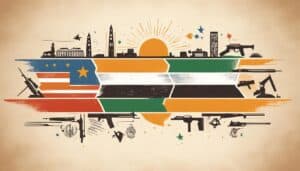
Exploring the Wealth of African Natural Resources
Did you know that Africa is home to some of the most diverse and abundant natural resources on the planet, including minerals, petroleum, and renewable energy potential? The continent’s vast reserves have the power to fuel economic growth, drive sustainable development, and protect biodiversity. However, the management and utilization of these resources remain critical challenges for Africa.

African natural resources, such as minerals and oil, have been both a blessing and a curse. On one hand, they hold the promise of economic prosperity and energy security. On the other hand, their exploitation has often resulted in corruption, environmental degradation, and unequal distribution of benefits.
In this article, we will delve into the impact of mismanaged natural resources in Africa, the need for a just transition, the importance of energy access in the global energy transition, and the potential for economic transformation and diversification. We will also explore how climate and agriculture, forestry and fishing, and mining and drilling play significant roles in shaping Africa’s natural resource sector.
Join us as we navigate the complex landscape of African natural resources and uncover strategies for sustainable development and responsible resource management.
Key Takeaways:
- Africa is rich in natural resources, including minerals, petroleum, and renewable energy potential.
- The mismanagement of natural resources in Africa has led to corruption, environmental degradation, and unequal distribution of benefits.
- A just transition is needed to harness the economic benefits of natural resources while preparing for a post-petroleum future.
- Access to affordable energy is a pressing issue in Africa, with 43% of the population lacking electricity.
- Economic transformation and diversification are crucial for maximizing the benefits of natural resources and reducing dependence on resource extraction.
The Impact of Mismanaged Natural Resources
The mismanagement of natural resources in Africa has significant consequences, leading to corruption, environmental degradation, and unequal distribution of benefits. These issues have hindered the continent’s ability to fully exploit its immense potential and create economic opportunities for its people.
Corruption is one of the major challenges associated with African natural resources. The profits generated from resource extraction, such as oil, gas, and minerals, are often siphoned off by corrupt officials or foreign corporations. This illicit flow of funds deprives local communities of the benefits they should receive, exacerbating poverty and inequality.
Environmental degradation is another critical consequence of mismanaged natural resources. Irresponsible extraction practices have resulted in deforestation, soil erosion, water pollution, and habitat destruction. These environmental impacts not only pose serious threats to biodiversity and ecosystems but also compromise the long-term sustainability of resource-dependent economies.
The unequal distribution of benefits is a deeply entrenched problem in many African countries. The wealth generated from natural resources tends to concentrate in the hands of a few, widening the gap between the rich and the poor. This inequality perpetuates social divisions and prevents equitable development.
Furthermore, the mismanagement of natural resources hampers economic opportunity and exacerbates unemployment rates. The lack of investment in human capital and infrastructure limits the potential for job creation and economic diversification. As a result, many African nations struggle to provide their growing populations with sustainable livelihoods and escape the cycle of poverty.
“The mismanagement of natural resources in Africa not only hampers economic development but also perpetuates poverty, inequality, and social unrest.” – African Development Bank
The Way Forward: Addressing the Challenges
To overcome these challenges, African countries must prioritize transparent and accountable resource management practices. Strong governance frameworks, anti-corruption measures, and effective regulatory mechanisms are crucial in ensuring that natural resource wealth benefits all citizens.
Economic diversification is also key to reducing dependence on resource extraction and creating sustainable economic opportunities. Investing in sectors such as agriculture, manufacturing, and renewable energy can promote job creation and foster inclusive growth.
Furthermore, environmental sustainability should be at the forefront of resource management efforts. Implementing responsible extraction practices, protecting ecosystems, and promoting biodiversity conservation are paramount to preserving Africa’s natural heritage for future generations.
| Consequences of Mismanaged Natural Resources | Solutions and Recommendations |
|---|---|
| Corruption | Implement transparency measures, strengthen governance frameworks, and combat corruption through rigorous enforcement of laws and regulations. |
| Environmental Degradation | Adopt sustainable resource extraction practices, promote reforestation and habitat conservation, and invest in renewable energy sources. |
| Unequal Distribution | Develop equitable revenue-sharing mechanisms, prioritize social programs, and invest in education and healthcare to ensure the benefits of natural resources reach all segments of society. |
| Economic Opportunity | Promote economic diversification, invest in infrastructure development, and prioritize the growth of industries beyond resource extraction. |
The mismanagement of natural resources in Africa is a complex issue that requires concerted efforts from governments, civil society, and international stakeholders. By addressing corruption, promoting sustainability, and fostering economic diversification, African countries can leverage their natural wealth to create inclusive, resilient, and prosperous societies.
The Need for a Just Transition
In order to have a just transition in Africa, countries need to harness the economic benefits from oil, gas, and mineral resources while also preparing their economies for a post-petroleum future.
The abundant African natural resources, including oil, gas, and minerals, offer immense economic potential for the continent. However, it is crucial to ensure that the exploitation of these resources is carried out responsibly and with a long-term vision. African countries must strike a balance between reaping the economic benefits of these resources and preparing for a future that moves beyond petroleum dependence.
The World Bank recognizes the significance of reinvesting the profits from natural resource extraction into the development of the countries and regions where these resources are located. This approach allows for sustainable growth, job creation, and poverty alleviation. By directing these funds towards economic transformation, diversification, and sustainable development initiatives, African nations can build stronger and more resilient economies for the future.
It is essential to acknowledge that the world’s energy landscape is rapidly evolving. The global shift towards renewable energy and the increasing urgency to address climate change necessitates a post-petroleum future. African countries should seize the opportunity to harness their natural resources to not only drive economic growth but also to facilitate a smooth transition towards sustainable energy sources.
“The just transition towards a post-petroleum future requires economic transformation, diversification, and significant progress on poverty alleviation.”
The investment in renewable energy infrastructure, such as solar and wind power, can provide alternative sources of energy and reduce dependence on fossil fuels. This not only contributes to mitigating climate change but also offers new job opportunities in the clean energy sector, fostering sustainable economic development.
A just transition also involves addressing the social and economic challenges associated with the decline of petroleum extraction. It requires proactive measures to ensure a smooth and equitable transition for communities and workers who may be impacted by the shift away from oil and gas industries. Investing in education, skills training, and diversification of the local economy can help create new employment prospects and ensure the well-being of affected individuals and communities.
| Benefits of a Just Transition | Challenges of a Just Transition |
|---|---|
| Economic diversification Sustainable development Job creation Poverty reduction Energy security | Dependency on fossil fuel revenues Resistance to change Disruption of traditional industries Social and economic inequality Skill gaps and retraining needs |
A just transition that maximizes the economic benefits of African natural resources while paving the way for a post-petroleum future is not without its challenges. However, through collaborative efforts between governments, industry stakeholders, and civil society, a sustainable and equitable path can be forged.
Energy Access and the Global Energy Transition
Access to affordable energy is a pressing issue in Africa, with 43% of the population lacking electricity. The International Energy Agency (IEA) recognizes that energy access is the immediate and absolute priority for Africa. While there is a push for a global energy transition, the IEA acknowledges that renewables alone cannot meet Africa’s energy needs.
“Africa will require all available energy sources to meet its energy needs.” – International Energy Agency
Africa’s natural resources, such as oil, gas, and minerals, are still crucial sources of government revenues, export earnings, and development potential. While the world focuses on transitioning to renewable energy sources, it is important to acknowledge that Africa’s energy needs cannot be met solely through renewables at this time.
It is necessary to leverage Africa’s natural resources to address the energy access challenge on the continent. This includes responsibly harnessing Africa’s oil, gas, and mineral resources while simultaneously investing in renewable energy infrastructure.
By diversifying energy sources and improving energy access, Africa can drive economic growth, improve living conditions, and contribute to the global energy transition.
| Advantages of African Natural Resources for Energy Access | Challenges for Energy Access in Africa |
|---|---|
| Africa possesses significant oil, gas, and mineral reserves Revenue from resource extraction can be used to invest in infrastructure and energy projects Natural gas can be used as a transitional fuel to reduce reliance on coal | Inadequate energy infrastructure Lack of investment in renewable energy projects High costs of energy production and distribution Political and regulatory barriers |
Renewable Energy Development in Africa
Africa has made significant strides in renewable energy development, with several countries leading the way in implementing clean energy solutions. For example, Morocco has invested heavily in solar power, while Kenya has established a successful geothermal energy sector.
The potential for renewable energy in Africa is vast. According to the International Renewable Energy Agency, Africa has the highest renewable energy potential in the world, particularly in solar, wind, and hydropower.

Investing in renewable energy infrastructure not only expands energy access but also contributes to a sustainable and environmentally friendly future for Africa.
Economic Transformation and Diversification
In order to maximize the benefits of African natural resources, it is crucial for African countries to focus on economic transformation and diversification. This entails investing in sectors such as agriculture, manufacturing, and renewable energy to create more employment opportunities and reduce dependence on resource extraction.
By diversifying their economies, African nations can mitigate the risks associated with relying heavily on the exploitation of natural resources. This approach not only promotes stability but also fosters sustainable development and long-term economic growth.
Investing in Agriculture
Agriculture plays a significant role in Africa’s economy, employing a large portion of the population and contributing to GDP. By investing in agricultural infrastructure, technology, and research, countries can enhance productivity, improve food security, and generate employment opportunities throughout the value chain. This focus on agricultural diversification can help lift communities out of poverty and reduce their reliance on dwindling natural resources.
Developing Manufacturing Industries
Developing robust manufacturing industries is another key aspect of economic transformation in Africa. By promoting value addition and local processing, countries can move up the value chain and harness the potential of their natural resources to create higher-skilled jobs and increase exports. This shift towards industrialization not only fosters economic diversification but also contributes to the development of a skilled workforce, technology transfer, and innovation.
Harnessing Renewable Energy
Africa’s abundant renewable energy potential, including solar, wind, and hydroelectric power, provides a viable avenue for economic diversification and poverty alleviation. By investing in renewable energy infrastructure and technologies, countries can reduce their reliance on fossil fuels, promote energy access, and foster sustainable development. This transition towards clean energy not only helps combat climate change but also creates new job opportunities and stimulates economic growth.
By prioritizing economic transformation and diversification, African countries can reduce their vulnerability to volatile commodity prices, enhance economic resilience, and foster long-term sustainable development. By investing in sectors beyond resource extraction, countries can leverage their natural resources to address poverty, create employment opportunities, and build a brighter and more prosperous future for their citizens.
Climate and Agriculture in Africa
Africa’s agriculture sector is heavily influenced by the continent’s diverse climate. Different climatic zones, including tropical wet, savanna, desert, Mediterranean, and highland, support various agricultural activities and crops. Agriculture is a crucial economic activity in Africa, employing two-thirds of the population and contributing to GDP. Factors such as temperature, precipitation, and dry seasons impact the types of crops that can be grown in different regions.
The tropical wet climate zone, characterized by high temperatures and abundant rainfall throughout the year, supports the cultivation of crops such as bananas, pineapples, and cocoa. This region is known for its lush rainforests and is important for biodiversity conservation.
The savanna climate zone, with distinct wet and dry seasons, is ideal for the production of staples like maize, millet, and sorghum. Livestock farming, including cattle, goats, and sheep, is also common in this region.
The desert climate zone, prevalent in areas such as the Sahara, Kalahari, and Namib, presents significant agricultural challenges due to extreme aridity. However, oasis farming and the cultivation of drought-tolerant crops like dates, figs, and melons are possible in these regions.
The Mediterranean climate zone, found in parts of North Africa, provides favorable conditions for growing crops like olives, grapes, and citrus fruits. This region is known for its mild, wet winters and hot, dry summers.
The highland climate zone, characterized by cooler temperatures due to altitude, supports the cultivation of crops such as coffee, tea, and potatoes. This region is also suitable for livestock rearing and dairy farming.
Adaptation to climate change is crucial for sustainable agriculture in Africa. Rising temperatures, changing rainfall patterns, and increased frequency of extreme weather events pose challenges to food security and agricultural production. Farmers and policymakers need to implement climate-smart practices, such as improved water management, crop diversification, and agroforestry, to mitigate the impacts of climate change and ensure long-term food production.
To illustrate the diverse climate zones in Africa and their impact on agriculture, the table below presents a comparison of key climatic factors and crops grown in each region:
| Climate Zone | Temperature | Precipitation | Key Crops |
|---|---|---|---|
| Tropical Wet | High temperatures | Abundant rainfall | Bananas, pineapples, cocoa |
| Savanna | Distinct wet and dry seasons | Moderate rainfall | Maize, millet, sorghum |
| Desert | Extreme aridity | Low rainfall | Dates, figs, melons |
| Mediterranean | Mild, wet winters and hot, dry summers | Moderate rainfall | Olives, grapes, citrus fruits |
| Highland | Cooler temperatures | Moderate rainfall | Coffee, tea, potatoes |

Forestry and Fishing in Africa
Africa is blessed with abundant forest cover, which plays a vital role in supporting the continent’s forestry sector. This sector is incredibly significant for Africa, as forest products contribute approximately 6% to the continent’s GDP, making it the most important economic activity.
However, the forestry sector in Africa faces its fair share of challenges, including illegal logging, overharvesting, and deforestation. These unsustainable practices not only harm the environment but also threaten the long-term viability of the forestry industry and its contribution to the economy.
A key area of concern within the natural resources sector in Africa is deforestation. Rampant deforestation leads to habitat loss, reduced biodiversity, and increased carbon emissions, exacerbating the global climate crisis. Efforts must be made to curb deforestation through legislation, enforcement, and sustainable forest management practices.
Furthermore, Africa’s fishing industry also plays a significant role in the continent’s economy. With an annual export value of $2.7 billion, fishing provides livelihoods to millions of people in coastal communities and contributes to food security.
However, overfishing and destructive fishing practices pose serious threats to marine and inland fish resources. I can’t emphasize enough the importance of promoting sustainable fishing practices to protect these valuable resources for future generations.
Now, let’s take a closer look at the forestry and fishing sectors in Africa:
Forestry in Africa
To highlight the significance of the forestry sector in Africa, let’s consider the following table that showcases key statistics:
| Statistic | Value |
|---|---|
| Contribution to GDP | Approximately 6% |
| Employment | Provides jobs to millions |
| Environmental Concerns | Deforestation, illegal logging, overharvesting |
| Sustainable Practices | Improving forest management, protecting biodiversity |
This table showcases the economic significance of the forestry sector in Africa, along with the environmental concerns that need to be addressed for sustainable development. It is essential to strike a balance between economic growth and environmental conservation to ensure the long-term viability of this sector.
Fishing in Africa
The fishing industry in Africa is of utmost importance, both economically and for food security. The following table highlights key statistics related to fishing in Africa:
| Statistic | Value |
|---|---|
| Annual Export Value | $2.7 billion |
| Employment | Provides income to millions |
| Challenges | Overfishing, destructive fishing practices |
| Efforts | Sustainable fishing practices, marine conservation |
This table reflects the economic significance of the fishing industry in Africa and the need for sustainable practices to ensure the preservation of marine and inland fish resources. It is crucial to strike a balance between exploitation and conservation to secure the livelihoods of fishing communities and protect the future of this vital industry.

Overall, the forestry and fishing sectors in Africa present tremendous opportunities for sustainable economic growth. By addressing challenges such as deforestation, illegal logging, overharvesting, overfishing, and destructive fishing practices, African countries can ensure the long-term viability of these sectors while protecting the environment and supporting local communities.
Mining and Drilling in Africa
Africa is renowned for its abundant natural resources, including valuable metals, minerals, and hydrocarbons. The continent is a major producer of gold, diamonds, uranium, platinum, and cobalt, playing a crucial role in the global mining industry. Furthermore, Africa boasts significant reserves of oil and natural gas, making it an essential contributor to the energy sector.
However, the extraction of these precious resources has not come without its challenges. Mining and drilling activities in Africa have often been associated with conflicts, environmental degradation, and social issues. Irresponsible practices, inadequate regulations, and the exploitation of local populations have marred the industry’s reputation.
Nevertheless, concerted efforts are being made to address these issues and promote responsible mining practices across the continent. The Kimberley Process Certification Scheme is a prime example of such initiatives, aiming to eradicate the trade of conflict diamonds and encourage transparency in the diamond supply chain.
Additionally, the Partnership for African Fisheries works to protect fish resources and promote sustainable fishing practices, ensuring the responsible management of this vital marine resource.
Responsible Mining and Drilling in Africa
Recognizing the urgent need for sustainability, African countries and international organizations have introduced regulations and guidelines to guide the mining and drilling sectors:
- The establishment of strict environmental impact assessments to minimize ecological damage during operations.
- The enforcement of labor laws to protect the rights and well-being of workers.
- The promotion of local content policies, encouraging the participation of local communities and businesses in the industry.
- The introduction of revenue management frameworks to ensure a fair distribution of wealth derived from natural resources.
These measures aim to ensure that the mining and drilling sectors support sustainable development, contribute to economic growth, and benefit local communities.
While challenges persist, the responsible management of Africa’s natural resources presents an opportunity for the continent to drive economic growth, improve living standards, and foster a more sustainable future.
| Mineral/Metal | Major Producers |
|---|---|
| Gold | South Africa, Ghana, Mali, Tanzania, Burkina Faso |
| Diamonds | Botswana, Democratic Republic of Congo, South Africa, Angola |
| Uranium | Niger, Namibia |
| Platinum | South Africa, Zimbabwe |
| Cobalt | Democratic Republic of Congo |
Conclusion: Exploring the Wealth of African Natural Resources
Africa’s abundance of natural resources provides a unique opportunity for sustainable development and economic growth on the continent. However, responsible resource management is essential to maximize the benefits and address the associated challenges.
African countries must diversify their economies and prioritize investment in sectors beyond resource extraction. Emphasizing renewable energy, agriculture, and manufacturing will create employment opportunities, reduce poverty, and ensure a brighter future for African citizens.
By harnessing the wealth of African natural resources and adopting sustainable practices, the continent can achieve long-term economic development while preserving its environment and promoting social well-being. Strategic planning and effective resource management are fundamental to achieving sustainable growth and prosperity for generations to come.
It is imperative for African nations to implement policies and regulations that promote responsible resource extraction, fair distribution of benefits, and protection of the environment. By doing so, Africa can ensure that its natural resources contribute to the overall development and well-being of its people and foster economic growth in a sustainable and inclusive manner.
FAQ
What natural resources does Africa have?
Africa is rich in natural resources, including non-renewable petroleum and mineral deposits such as gold, diamonds, uranium, platinum, and cobalt. It is also home to significant oil and natural gas reserves.
How have natural resources affected West African history?
Natural resources have played a significant role in West African history. The extraction and trade of resources such as gold, salt, and slaves have influenced political power, cultural exchange, and the rise and fall of empires in the region.
How do natural resources contribute to the South African economy?
Natural resources, particularly mineral wealth, contribute significantly to the South African economy. The mining sector is a major source of export earnings, job creation, and government revenue.
What are some natural resources of Africa?
Some natural resources in Africa include oil, gas, minerals (such as gold, diamonds, uranium, platinum, cobalt), timber, fish, and agricultural products (such as cocoa, coffee, and palm oil).
Who owns Africa’s natural resources?
Africa’s natural resources are owned by the countries in which they are located. However, in many cases, extraction and trade agreements involve foreign companies and investors.
How many natural resources does Africa have?
Africa has a diverse range of natural resources, including various minerals, oil, gas, timber, and agricultural products. The exact number may vary depending on how resources are categorized and classified.
Why is Africa rich in natural resources?
Africa’s richness in natural resources can be attributed to its geological history and diverse ecosystems. The continent’s tectonic activity has resulted in the formation of mineral deposits, while its climatic and ecological factors support abundant biodiversity and agriculture.
Which African country is rich in natural resources?
Several African countries are rich in natural resources. For example, South Africa is known for its minerals, including gold and diamonds, while Nigeria has significant oil reserves. Other countries with diverse resource wealth include the Democratic Republic of Congo, Angola, and Zambia.
Why are natural resources important to Africa?
Natural resources are important to Africa as they contribute to economic development, government revenue, job creation, and export earnings. However, their sustainable management is essential to avoid the negative impacts of overexploitation and environmental degradation.
Related read: Exploring the Rich Heritage of the African Diaspora







